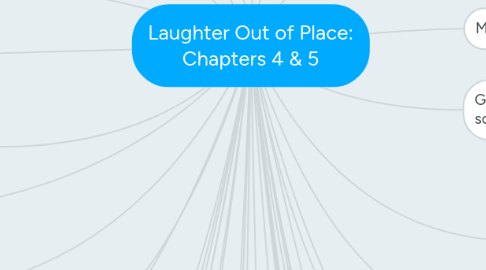Laughter Out of Place: Chapters 4 & 5
by Natasha Ayers

1. Gang Life: Seen as the only way out of poverty, only way to avoid working as a slave
2. Gang Life: Male Dominance
3. Child-Centeredness of the Middle & Upperclasses
4. Mirelli: Prisoner of CHildhood
4.1. Broken childhood. Alcoholic Parents. Stray parents. Eating out of the garbage for meals. Incarcerated in detention centers. Started having kids by 14.
5. Gloria: Patron Saint of Felicidade Eterna
6. Girl children: da rua
6.1. Of the street. Presumably loose; accustomed to sexual advances from others. Permanently in a predicament to be taken advantage of.
7. Pedro Paulo: Anti-Abortion Irony
7.1. Believed his "woman" should be killed if she had an abortion, because it was murder on his child. Same man who ended up dead, not raising this child, or providing for this child due to his love of the gang-life.
8. Increasing violence over the years
9. Gangs: Necessary Evil
9.1. Violent but also peace-keeping. Like a local police force for every favela. Hero vs. vilain.
10. Drug Trafficking: Economic Importance
10.1. Elite & Middle Class people are the ones buying the drugs, reinforcing their economic prowess. Therefore, the elite and middle class are the ones perpetuating this gang activity.
11. Gangs: No Opportunity
11.1. The guys involved, if they had other legit options for building lives, they would not be doing this. Little opportunity means little ability to advance.
12. Guns: Symbol of Masculinity
12.1. Joining a gang meant one got a gun.
13. Gang as Medium
13.1. Serving as an in-between for the people of the favela and the police.
14. Abortion: Only mention of birth control.
14.1. Controversial. Male control.
15. Childhood:
15.1. Not when you're poor. However, completely opposite situation for the middle/ upper classes, where children reign supreme.
15.2. Family Values
15.2.1. Utterly Broken
16. Abortion is the only mention of any birth control.
16.1. Favelas are way overpopulated, and birth control would be useful. How evil, or like murder is abortion if these children are not going to be cared for, and if they are going to grow up to lives of crime, that leave them susceptible to murder down the road? Waste of resources.
17. Family Values
17.1. Skewered upon these broken families.
18. Families among the poor are completely distorted.
19. Murder
19.1. Extremely high murder rate in favelas.
20. Color/ Class
20.1. Color dictates class. Class dictates how one lives. Which dictates fate.
21. Pedro: Male dominance; incarcerated.
22. Gloria: Honest Work
22.1. Slaves Wages
23. Laughter & Tears
23.1. Gloria sheds no tears over Pedro's death; she was done shedding tears for him. While her son's father, who had nothing to do with him, nothing to dow tih raising him, weeped for his loss.
24. Strip search to enter the prison; all rights removed.
25. Gloria had a first child when she was still a child
26. Gloria had no childhood; raised with slave ideals, had a live-in lover by the time she was a young teen.
27. Her eldest child, Pedro, upon meeting Donna Goldstein in prison, actually believed for a moment that she could be Gloria's "white daughter."
28. Amelia, the crente
28.1. Religious martyr, made herself (possibly, emotionally/ sexually) available to Adhmar.
29. Paulo: ahead of his peers. highly intelligent, politically aware. Educated on poverty
29.1. Bad events, while not happy or funny, are later going to become fodder.
30. The gang: Red Command: Family Values
30.1. Though Pedro is in prison, long term, for robbery. Values?
31. Gloria, even amongst the two boys in prison, was considered the queen bee.
31.1. Gloria was obviously not someone to be crossed.
32. Pedro returned to gang life upon release from prison.
32.1. Taught his child about guns.
33. Pedro: assumed fatherly responsibilities.
33.1. Josilene did not abort the child, and he did what he said he woulf do, and took care fo the child.
34. Gloria blamed herself for her son, Pedro Paulo's downfall.
34.1. She was so busy working to take care of him financially, she left him to the streets
35. Police
35.1. Not very favorable to the people of the favela. The police are feared, very brutal to the poor.
36. Religion
36.1. People are looking to be saved. Clinging to anything as a safety net.
37. Marriage
37.1. Odd concept. Marriages do not work. They are bound to fail. Nearly every marriage mentioned fails.
38. Violence
38.1. Entirely abundant. Constant fear. Local terrorism on many levels: gangs, bandits, police.
39. Culture of Indifferent Widows
39.1. 2 of Gloria's daughters were widows very young.
40. Women: Lesser
40.1. Viewed as lower entities, sexual subserviants in a male dominated culture


